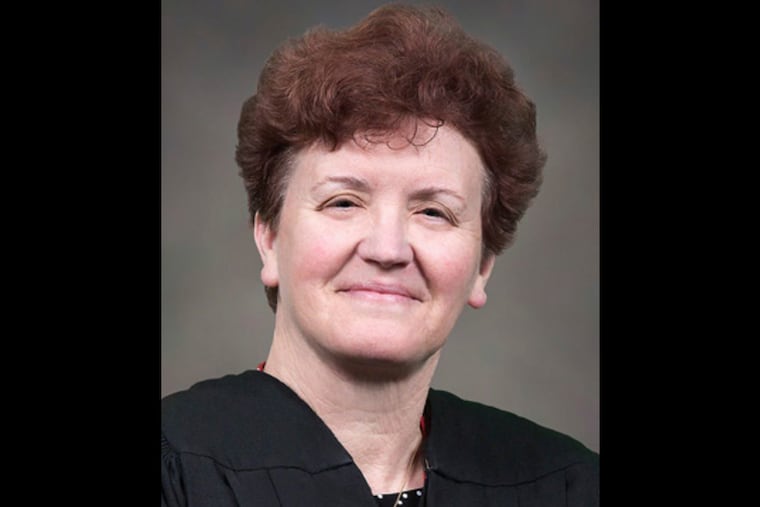Philly Judge Anne Marie Coyle has been accused of bias and impropriety in a complaint by public defenders
The Defender Association of Philadelphia alleged that Common Pleas Court Judge Anne Marie B. Coyle violated judicial rules mandating impartiality and the avoidance of improper conduct.

A Philadelphia Common Pleas Court judge up for retention Nov. 7 was the subject of a scathing judicial conduct complaint filed by the Defender Association of Philadelphia in February, according to confidential records newly obtained by The Inquirer.
The judge, Anne Marie B. Coyle, is accused of biased and improper handling of a case, including threatening to hold both the prosecutor and defense lawyer in contempt; “attempting to coerce” the defense lawyer to recuse himself; and improperly offering the defendant leniency if he would drop a motion for Coyle to recuse herself. The documents also allege that Coyle endangered a defendant by revealing details of a sealed plea agreement.
Coyle, elected to the bench in 2013, is seeking her second 10-year term. Among the 10 Common Pleas Court judges and six Municipal Court judges seeking retention in November, Coyle is the only one rated as “not recommended” by the Philadelphia Bar Association.
She did not respond to an email and a phone message seeking comment. A spokesperson for the Philadelphia courts said in a statement: “All allegations are highly confidential and must be fully investigated to determine their veracity. Judges are prohibited from publicly discussing these kinds of matters.” The Defender Association declined to comment.
Melissa L. Norton, chief counsel for the Judicial Board of Conduct of Pennsylvania, said the board’s process is confidential and its timeline for investigations varies widely from case to case. The board receives 750 requests for investigation in a typical year, the vast majority of which are declined. In some cases, Norton noted, “Judges can receive private discipline, or judges can make a determination that it’s time to retire.” Only a handful of requests for investigation result in public action before the state’s Court of Judicial Discipline.
In Coyle’s matter, the confidential request for investigation centers on her handling of the case of Johnny Colon, which was detailed by The Inquirer in a 2019 series, “The Probation Trap,” which revealed that the sentences Coyle imposed on probation violators were the harshest of any Philadelphia judge.
Colon had been serving probation when he was arrested again during a drug raid on a relative’s house. The charges in the new case were all eventually dismissed by a different judge. But, by then, Coyle had already required the assistant district attorney, under threat of contempt, to put on a hearing about whether the case amounted to a probation violation. She found Colon had violated his probation, and sentenced him to 5½ to 14 years in prison.
The Pennsylvania Superior Court, in a 2021 opinion, overturned that punishment, saying he had not been given proper notice of all probation violations that Coyle considered in her sentencing. That, the court said, was “a clear violation of Colon’s constitutional rights.”
Unprompted, the court also said there might be reason to disqualify Coyle from handling the case, citing “Coyle’s previous animus toward the district attorney” as well as her “treatment of Colon and defense counsel.”
» READ MORE: The Probation Trap: How lenient sentences can lead to incarceration
Colon’s lawyer then asked her to recuse herself. But Coyle remained on the case. At a hearing in 2022, Coyle raised the subject of The Inquirer series, and accused Colon and his lawyer, Leonard Sosnov, of violating her protective order. She urged the public defender to withdraw from representing his client to avoid repercussions “in the form of disciplinary action, in the form of contempt action, in the form of any myriad of possibilities that may exist.”
At a second hearing, two days later, Coyle urged Colon to drop the recusal motion against his lawyer’s advice and to allow her to impose a new sentence that would make him eligible for parole. When he declined, she finally recused herself from the case.
The Superior Court has criticized Coyle’s apparent bias or abuse of discretion in at least five opinions other than the Colon case.
“That’s incredibly unusual,” said retired Common Pleas Court Judge Benjamin Lerner, particularly for someone on the bench for a single 10-year term. “I can tell you this from experience: The appellate courts in Pennsylvania, in criminal matters in particular, do not go out of their way to specifically name or criticize trial judges. ... They really have to be fed up, it seems, with what they’re getting in terms of appeal from a particular trial judge’s courtroom.”
In a 2018 opinion, the court found Coyle made a “manifestly unreasonable” decision to allow a jury to convict a man in absentia while he was hospitalized and intubated.
In a 2020 decision on the case of Aaron Lucky — who had been on Coyle’s probation for stealing $120 worth of body wash from a store — the court again cited her “animus” against the DA and her “frustration” with Lucky as leading her to abuse her authority. It found that there was reason to question whether Coyle was unbiased and impartial when she found Lucky in violation of probation for missing some appointments and failing a drug test — and sentenced him to up to seven years in state prison.
That same year, the Superior Court overturned a lengthy sentence imposed by Coyle on a defendant named Frank Brown. It noted: “The record of the multiple sentencing hearings in this case is extraordinary. In addition to the errors of law, the record is rife with personal interactions, perceived slights, and sua sponte [on her own impetus} reconsiderations of sentence that, at the very least, created the appearance of personal bias.”
Then, in 2022, it found she abused her discretion once again by denying Brown’s request that she recuse herself from his case.